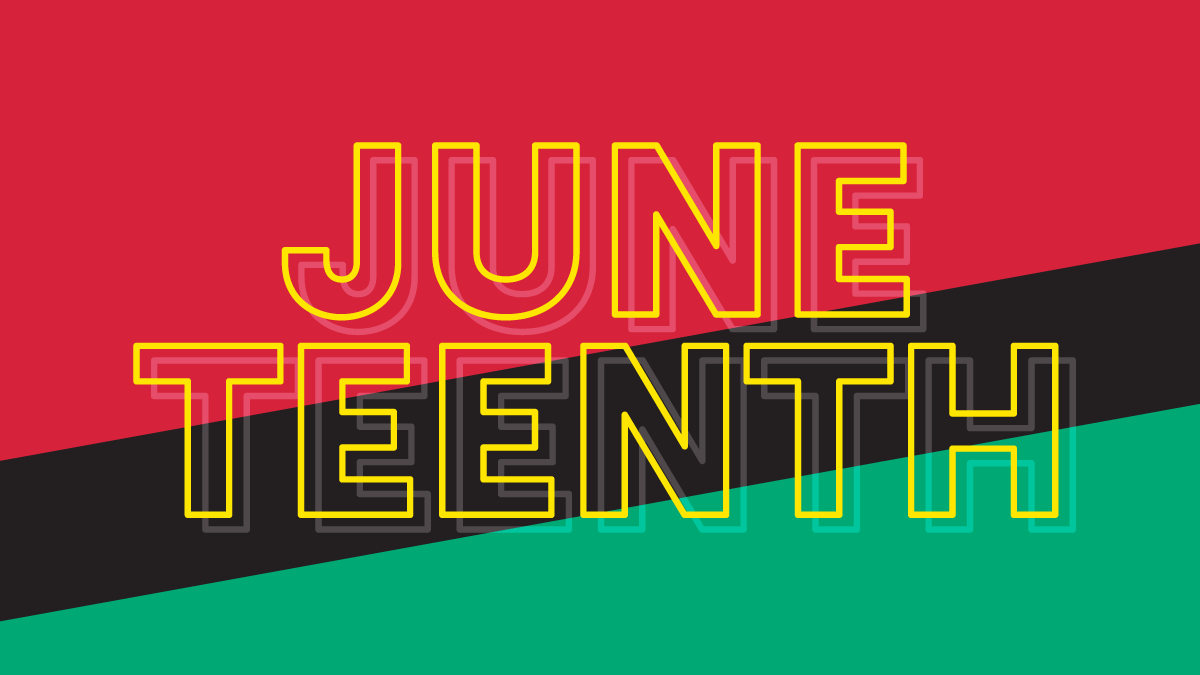Celebrating Juneteenth: This Year and Every Year
How did enslavement end in the United States?
Was it
A) The Emancipation Proclamation,
B) The Civil War, or
C) Abraham Lincoln?
The answer is… none of the above!
If you did take a quick pause and answered one of the three options, then you may only know the first part of the “How Enslavement Ended in America” story. But on a serious note, if you did answer one of the three options, you’re not 100% wrong… but you’re also not 100% right.
You might have noticed I’m using the terms “enslavement” rather than “slavery,” “enslaved” rather than “slaves,” and “enslaver” rather than “slave owner.” This was no accident! Before we dive in and expand our knowledge on Juneteenth and its importance, let’s first understand the importance of communicating in the right language.
Why Does Communicating in the Right Language Matter?
Although substituting the word “slave” for “enslaved” may seem like a subtle change, this change leaves a monumental difference in terms of how people feel and understand history. The adjective “enslaved” centers on humanity first. Africans in slavery were people first who remembered and cherished their lands, their traditions, and their names.
Using the term “enslaved” restores their identity and helps us remember and understand that there was an injustice done. These men, women, and children were not property that could be owned, they were human beings with the same inherent dignity, rights, and feelings as anyone else. It’s important to communicate language that stresses the humanity of individuals rather than their characteristics. People weren’t slaves; they were enslaved.
Language empowers and disempowers. How we communicate language can lead to building a true understanding of our history and it helps marginalized people tell their own stories. It’s imperative that we actively engage with history if we hope to make progress in ending the systemic racism Black Americans continue to face. When we change our language, we are helping ourselves get real. Being sensitive to how we communicate language in this way helps to honor the humanity of enslaved Africans. Additionally, discarding the word “slave” (which reduces people to a non-human noun) is itself a form of freedom.
A Brief History Lesson on How Enslavement Ended in the United States
President Abraham Lincoln issued The Emancipation Proclamation on January 1, 1863, declaring all enslaved African people in Confederate states “shall be then, thenceforward, and forever free.”
The Emancipation Proclamation didn’t instantly free all enslaved African Americans. The news didn’t travel back then like it does today. You would think that an Executive Order issued by the President would instantly alert everyone in the country and be followed almost immediately. After all, in today’s world enriched with immediate communication, the second an Executive Order is passed by our President, everyone on Twitter knows about it in a matter of minutes. But this was the late 1800s, and that gap in communication, along with resistance from enslavers, caused enslavement in Texas to continue for another 2.5 years post-Civil War.
What is Juneteenth?
On June 19, 1865, after the surrender of General Lee that April, General Granger’s arrival in Galveston with forces that were strong enough to overcome the resistance signaled freedom for the 250,000 enslaved African Americans in Texas. When the enslaved African American people heard about the end of the war and their freedom, a cry of joy and celebrations broke out among newly freed African Americans, which gave birth to “Juneteenth.”
Juneteenth marks an important milestone in Black History in the United States. Juneteenth—also known as Emancipation Day, Freedom Day, Liberty Day, Jubilee Day, and Cel-Liberation Day—is an unofficial holiday is now a federal holiday commemorating the end of slavery in the United States.
What Are the Origins of Juneteenth?
Juneteenth was originally celebrated in Texas on June 19, 1866, to mark the first anniversary of the day that General Gordon Granger read the Emancipation Proclamation to the people of Texas. In his speech, Granger said:
The people of Texas are informed that, in accordance with a Proclamation from the Executive of the United States, all slaves are free. This involves an absolute equality of rights and rights of property between former masters and slaves, and the connection heretofore existing between them becomes that between employer and hired laborer. The freedmen are advised to remain quietly at their present homes and work for wages. They are informed that they will not be allowed to collect at military posts and that they will not be supported in idleness either there or elsewhere.
Although the announcement urged free men and women to stay with their former owners and work for wages, most freedmen and freedwomen weren’t eager to stay with the people who once enslaved them. So they scattered in search of their family members or migrated to the north in hopes of starting a new life.
Settling into a new life as free men and women brought on new sets of realities and challenges for African Americans. However, the memories of that significant day in June of 1865 and its festivities served as a day that was motivational to many, as it was a way to acknowledge the “freedoms” gained in the past as well as the continued advancement for a better future.
How Is Juneteenth Celebrated?
Juneteenth was originally celebrated with prayers, with the gathering of remaining family members, and by wearing new clothes to represent newfound freedom. Eventually, African Americans from Texas migrated to other states and the celebration of Juneteenth soon spread across the country, making it an annual tradition that has been celebrated for the past 156 years.
Juneteenth is a treasured day at heart—after all, it’s a celebration of freedom. This doesn’t, however, necessarily make it an easy holiday to celebrate, especially in 1866. This marked the first anniversary of the announcement because segregation laws were spreading fast. The next year wasn’t any easier, and neither were the next couple of decades. Despite the obstacles free men and women faced, they still made an attempt to come together every year to celebrate.
Juneteenth celebrations declined during the 1960s, being overshadowed by the civil rights movement. In 1968, however, the holiday reignited when the Poor People’s Campaign, originally led by Martin Luther King Jr., held a Juneteenth Solidarity Day. In the following decades, interest in Juneteenth continued to rise and the first state-sponsored Juneteenth celebration was held in Texas in 1980.
Today, Juneteenth celebrations in the United States vary significantly from region to region. In southern states, the holiday is traditionally celebrated with oral histories and readings, red drinks, and barbecues. In fact, sipping on red drinks is a special type of tradition because it symbolizes perseverance and honors the blood that was shed on African Americans. In honor of the Black nationalists, some states serve up Marcus Garvey salad with red, green, and black beans. In the southwest, Rodeos have become part of the tradition, while concerts and parades are a common theme across the country.
Juneteenth is an important day to not only celebrate but for all of us to reflect on as well. The question we should all be asking is, what does true freedom look like? And what does it look like for the Black community who still faces systemic injustices today?
Ways You Can Celebrate Juneteenth This Year:
- Educate yourself on issues the Black community faces by reading books, reading articles, and watching videos, studying Black history, Black poets, Black leaders, and Black achievements. Once you start to educate yourself on Black history, think and reflect on how mindsets, policies, and systems today are impacted by the past enslavement of African Americans.
- Gather with your family and friends on this day and share what you are learning, share resources, and ignite discussions around Black history and the impacts we see today.
- Communicate! This Forbes article from 2018 shares another way to recognize Juneteenth this year is to consider asking people you know if this is a meaningful day for them (do not assume all African Americans know about or celebrate Juneteenth). When people share, enjoy the gift of hearing a perspective outside your own.
- Use this day as a day of service. Go out and volunteer at local organizations. African Americans still face disproportionate inequality regarding voting in the United States. So it would be a good idea to even volunteer at a local voter registration organization.
- Check out virtual and local celebrations and parades. You can even join in on virtual museum tours to learn more about Black culture, history, and achievements to recognize and celebrate this important day even remotely!
How to Support the Black Community All Year Long
Supporting the Black community isn’t just a one-day thing, it’s an ongoing effort. Here are some ways to continue to fight against systemic racism and to support the Black community all year long:
- Patronize Black-owned businesses and organizations. In this post, I created a shortlist of local Black-owned businesses in the Raleigh and Durham area. If you’re looking for more options online, this is a great app to get you started.
- Be an ally and continually speak out against injustices by having those “uncomfortable” conversations, continually educating yourself and sharing, peacefully protesting when the time arises, signing petitions, contacting your local representatives, and attending local events.
- Find organizations that you can help by donating monthly or by volunteering frequently. Look out for opportunities to volunteer and give back to the community (there are plenty of organizations to start supporting in this post alone). If you’re looking for more, here’s a list of 135 organizations that benefit Black communities.
Make sure to put Juneteenth on your calendars this year and every year. Take this day as a way to remember, recognize, celebrate, and appreciate Black culture and all of its endless achievements while continuing to fight for change.




